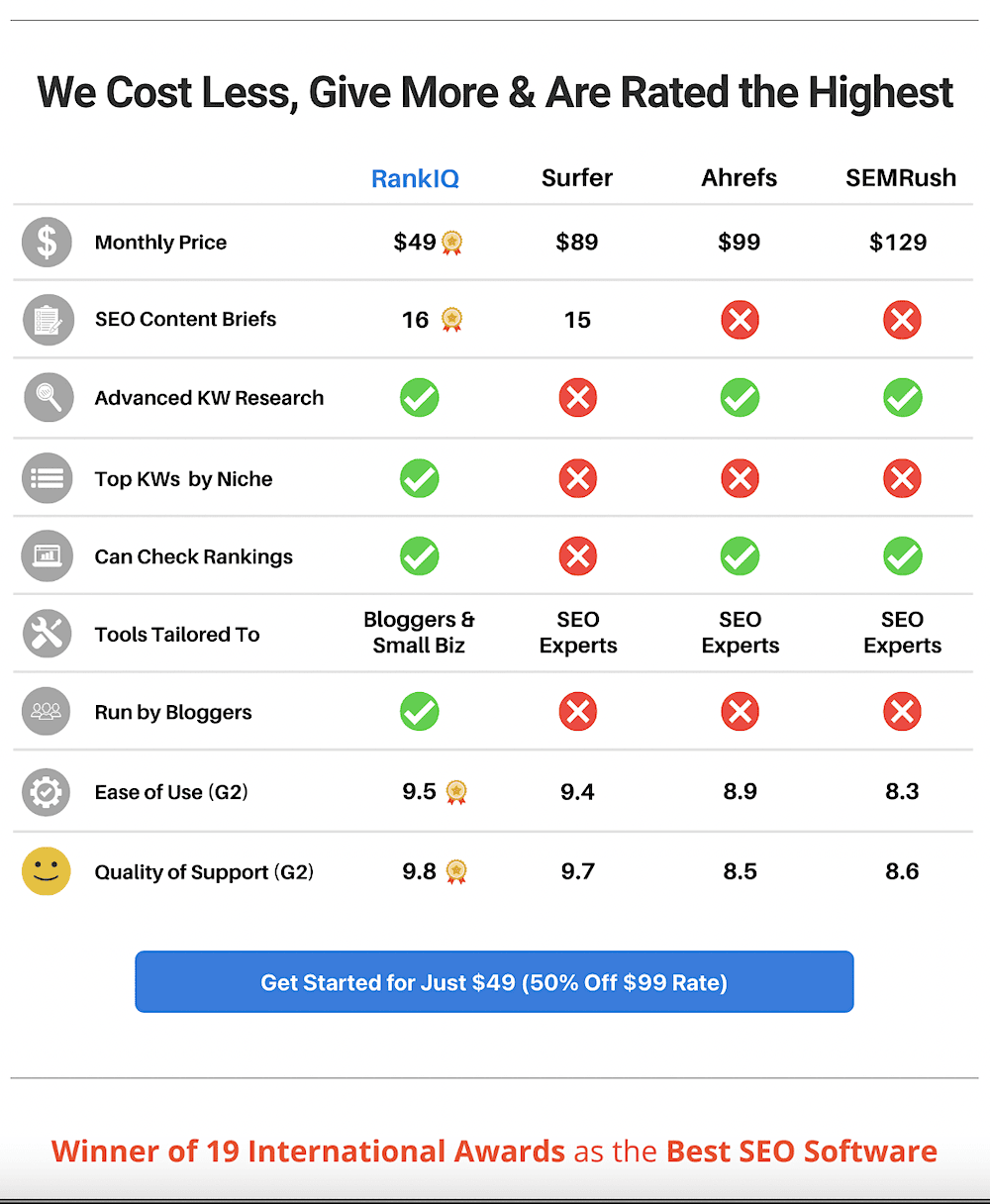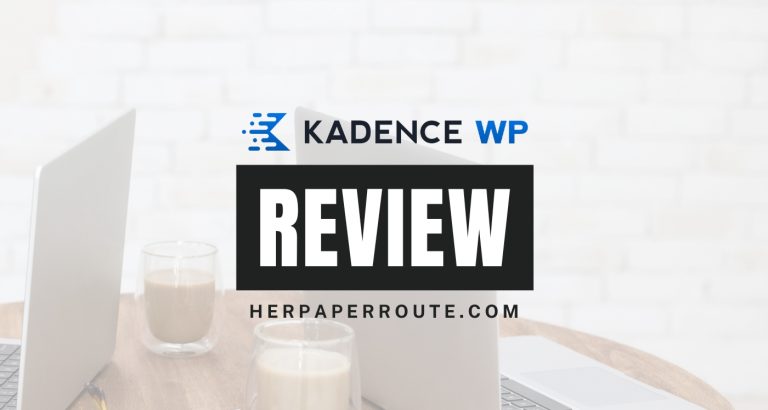RankIQ Review: Is This The Best SEO Tool for Bloggers in 2024?

This is the ultimate RankIQ review where an actual RankIQ customer gives their honest thoughts on the pros and cons of the tool.
RankIQ is an AI-powered SEO blogging tool made by a blogger for bloggers. It gives you access to a keyword library that can help you find the right keywords for your blog, and optimize your content so that those keywords are artfully included.
As an affiliate partner of various brands and sponsored content, HerPaperRoute may earn commission on qualifying purchases. Disclaimer
But does RankIQ really stand up to the hype? There are a lot of tools out there for bloggers that do the same things that this one does. So, is this really the best pick?
🧩 Get $50 Off RankIQ with this link!
Let’s take a deep dive into this tool and see if it might be the right fit for you. I’ll also share some great RankIQ alternatives so you can make the best decision for your blog and business.
What is RankIQ?
RankIQ is an AI-powered SEO tool that helps bloggers of ALL skill levels create killer blog posts that can rank on Google. Of course, there’s no guarantee that just because you use their tool means your post will rank.
However, their AI SEO tactics (assuming you take full advantage of them) make the chances that Google likes the content you put out more likely.
Created by Brandon Gaille, host of the Blogging Millionaire Podcast, RankIQ was created specifically for bloggers looking for reliable SEO tools that can help them perform better on Google searches.
Not only can it help you find the right low-competition keywords, but it helps do a comprehensive content analysis so that what you create can be better than everyone else’s.
Whether you’re an SEO expert or a beginner blogger, this is a great tool that comes highly recommended by many professionals.
It’s an easy-to-use optimization tool that just might allow you to bring in quality traffic.
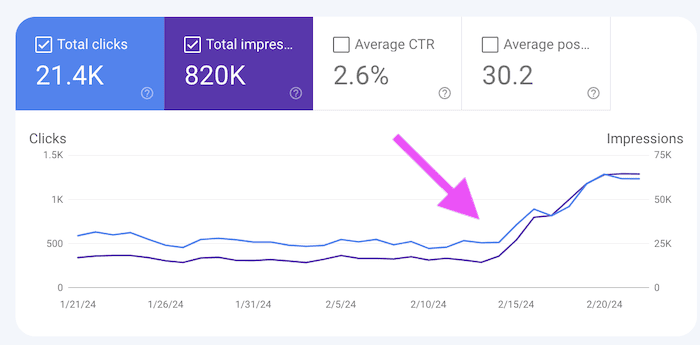
RankIQ Features
I’m not going to lie, RankIQ isn’t the only tool out there that produces an SEO report, provides a way to find high volume, low competition keywords, gives you a target word count and helps you rank higher on search engines.
With that in mind, it’s worth digging into the details and features of what makes this AI SEO tool tick, and how you can use it to grow your own business.
These are the key features that content creators will be interested in.
Closer Look At RankIQ’s Keyword Library
The Keyword Library is exactly what it sounds like — a curated library of keywords that are low competition with higher search volume. These keywords are broken down into pre-curated lists that have been created, primarily by request of RankIQ users.
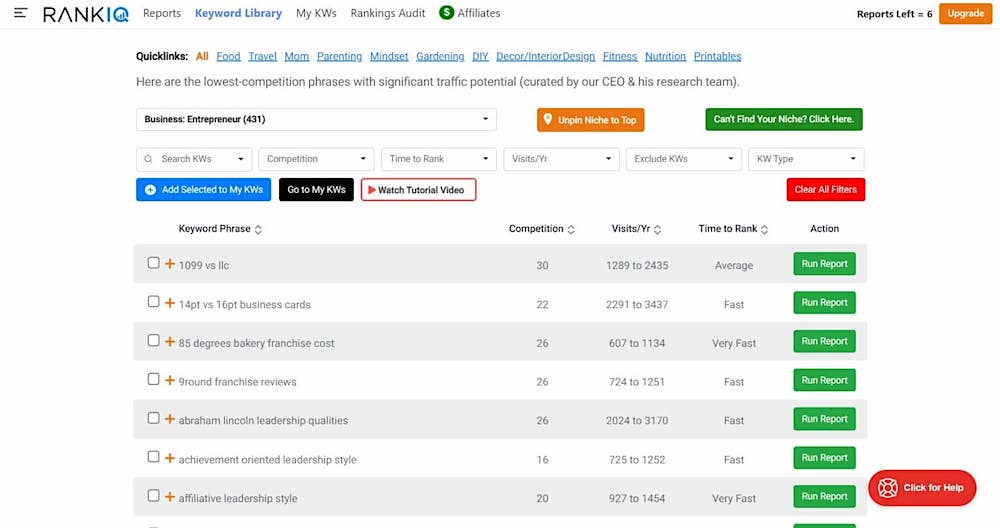
You’ll find a whole host of keywords in a variety of niches, including:
- Arts and Crafts, like drawing, painting and pottery
- Business, like office chairs, PayPal and packing
- Collectibles, like digital art or Star Wars
- Farming, like dairy cows and animals
You can sort the keywords via volume (described as visits per year), competition (based on their own score), and time to rank (sorted by Ultra Fast, Fast, Average). You can also choose Run Report or select the + button to add the keyword to your list.
What happens if you can’t find your niche?
There’s a niche library search tool you can use. You input a few primary keywords from your niche and the tool searches the database in case it’s something that’s stored over several different niche lists.
If you STILL can’t find your niche, there’s an opportunity to reach out to the RankIQ team and ask them to add your niche. The team will typically add niches as soon as they can. But, a word of warning, it can take a while for it to be added.
There are A LOT of niches in the RankIQ library. If you can’t find your own niche in there already, look for something adjacent. I’ve run into very few things that I’ve not been able to find thus far. While there is a chance, most niches will be covered.
How accurate is the data in RankIQs keyword library?
I want to preface this by telling you that RankIQ’s keyword library is probably my favorite part of the tool. Their suggested keywords help cut down the process of finding keywords by giving you a solid starting point.
However, the actual accuracy of their data varies. To be clear: absolutely no system out there is perfect and you’ll get different information based on how they each calculate their own metrics.
Google is really the only company out there that can tell you how many people are searching for what and when. And honestly, they don’t share that information.
Bundling that with the fact that metrics like “difficulty” are purely made up, there is NO tool on the market that is all that accurate.
That said, when I find keywords in the RankIQ library that I’m interested in covering, I ALWAYS throw them into another system (usually Keysearch) to get a second opinion.
When it comes down to it, the ultimate determination on the topics Google likes for my audience comes from yours truly. I’ve been writing on my topics long enough to have a general idea on whether or not I should write or update post content on a keyword.
So, ultimately, while I somewhat question their data, I also don’t expect that they are that accurate. It’s a paid SEO tool, not the be-all, end-all on my topics.
Mediavine blogs using RankIQ increased their Google traffic 468% more than the Mediavine blogs not using RankIQ.
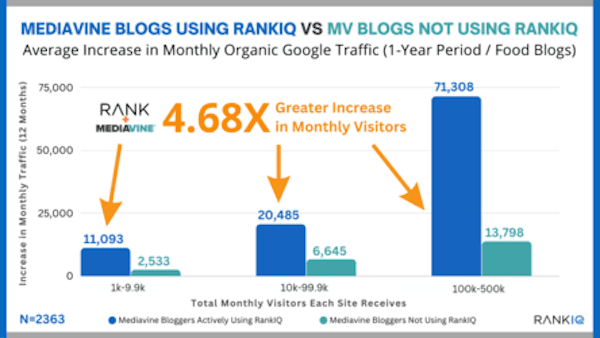
My Keywords
Once you’ve added a keyword (or 16) to your list, they end up in My Keywords. ANYTHING that you’ve added can be found here.
Word of warning: it can get a little messy in there, as, unlike other tools like WriterZen or Keysearch, you can’t set up your own lists or folders to sort through.
However, I do like that you can search for a “type” of keyword. It’s useful if you want to work on affiliate posts or something more informational.
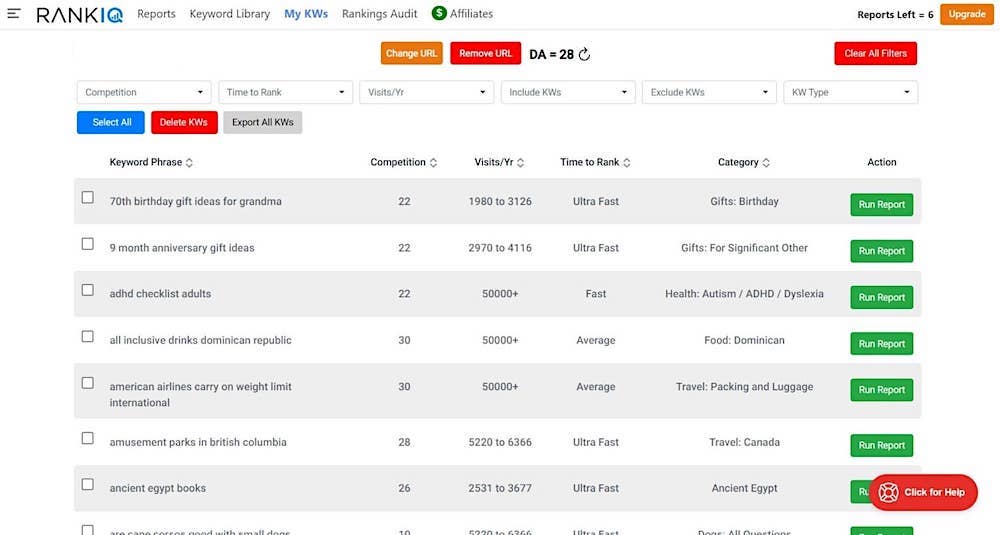
My other big complaint about the database is that you can’t weed out categories, which is a real pain for someone like me who runs multiple blogs.
Honestly, this probably isn’t going to be a problem for most bloggers, but is worth mentioning if you’re managing more than one property.
From here you can also choose Run Report, which allows you to choose to run an SEO report right from there instead of having to go to the Reports section to do it. This is really where you determine what topic your next great article will be on!
Rankings Audit
To use this tool, you need to go to the Ranking Audits option in the top menu, connect your Google account and select the Google Search Console property you want to analyze.
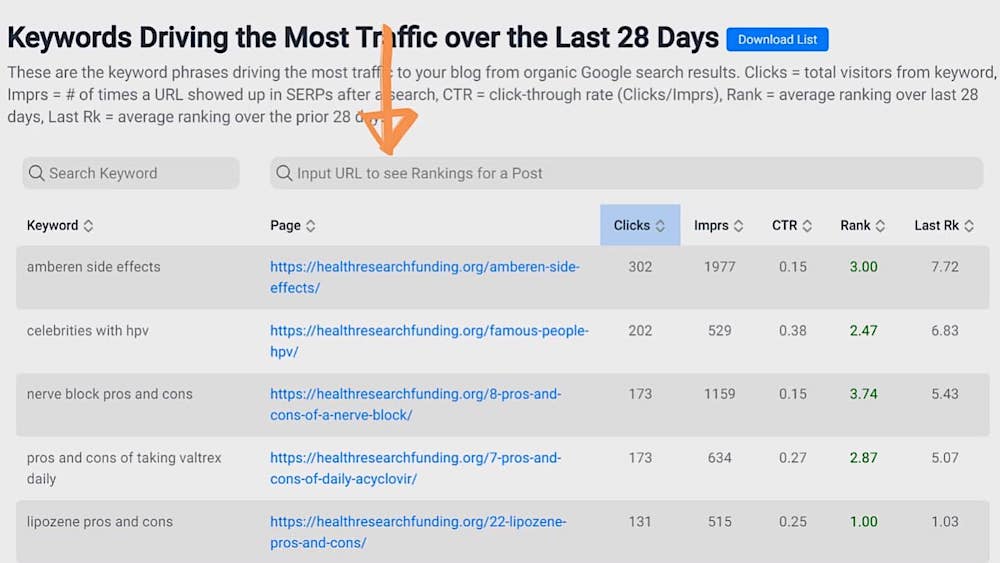
It’s worth noting that this is a one-property kind of tool, so you’ll just want to hook up whatever one you’re using if you have more than one.
It will then analyze the content you have published on your site and tell you what’s bringing in the most traffic. You can copy a URL and search it, which allows you to see the keyword phrases that are bringing in the most traffic for that specific page.
If you’re just running a single niche website and you want everything all in one place, this could be a really good tool.
Reports
Reports are where the magic happens in RankIQ. Each account gets a specific amount they can run each month based on their plan (8 or 16 for MOST people).
You choose the Run Report button and once the tool is done doing its magic, you can now start to write your perfectly optimized post.
There are two parts to any report: the SEO Report and the Content Optimizer.
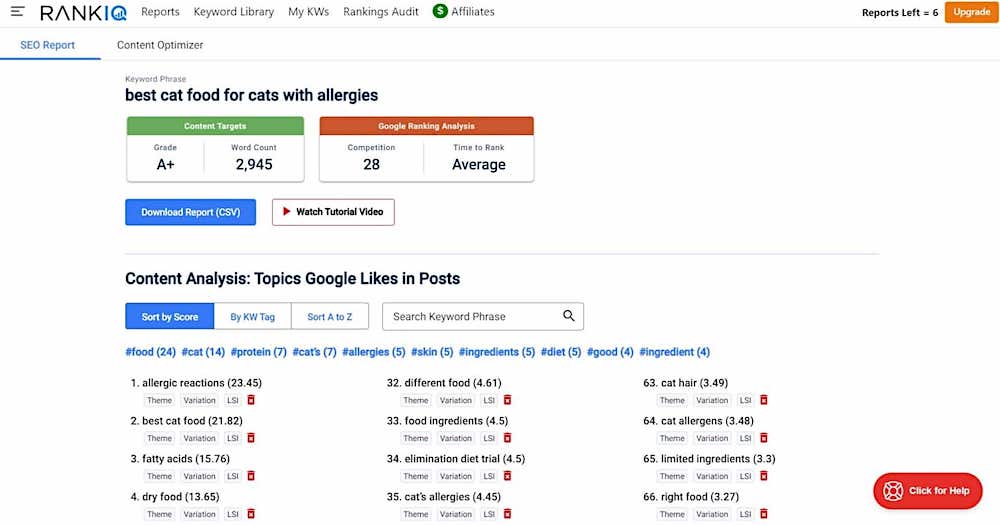
SEO Report
The SEO Report breaks down what the successful blog content that’s already published has in it. It provides you with:
- The Target Grade which you’ll use more in the Content Optimizer
- The Target Word Count which tells you how long your post should be
- The Topics Google likes to see included in the post, this includes LSI keywords
- The Title Analysis along with a title grader tool you can use
- Information on the current highest graded posts in Google
Even if you aren’t going to use RankIQ’s Content Optimizer, this SEO report provides you with some seriously valuable information that you can use to create optimized blog posts.
All of this information can be downloaded into a convenient CSV document that you can then pass along to a writer (assuming you use them) or you can use it on your own in a different program (like Google Docs if you like to keep things basic).
The information that’s in the SEO report – everything from the target word count to keyword ideas is what you want to be using to build any content briefs for your small business or blog. It’s also what informs the Content Optimizer.
Content Optimizer
The Content Optimizer acts as an analysis tool that breaks down the content you’ve already written (ie. you need to write it inside their tool or paste it into there), and help you optimize your content better for Google traffic.
At the top of the content optimization tool, you’ll find a grade that RankIQ has determined for the content that you currently have in the word processor (it’ll be an F when you first start out and haven’t added anything there yet).
This grade will be paired alongside your target grade, and will change while you write blog posts and edit them.
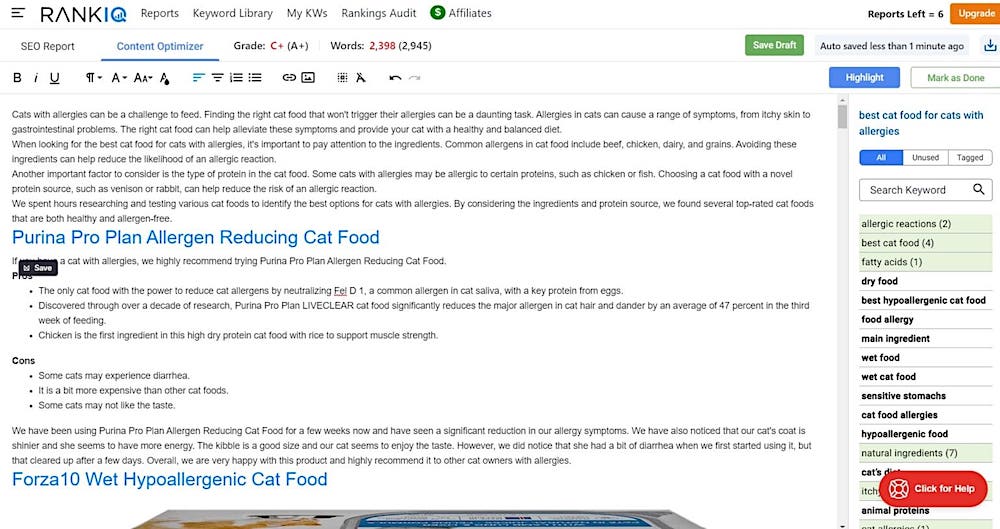
Beside the grade, you’ll find the word counter beside your target word count. This will also eb and flow as you write your content.
For a better chance at ranking high, you want to match both of these as closely as possible, regardless of whether you’re a food blogger, talking about personal finance or writing in ANY other niche.
On the right-hand side, you’ll find the keyword tools. This gathers up all specific keywords that were included in the SEO Report and ticks them off as you include them in your content.
You want to include as many as possible until you get to your target grade and word count – adding in too many can over-optimize your content, and honestly… you don’t want to do that!
There’s also an option to highlight the keywords you’ve already used in your document. This will let you figure out how you’ve distributed them so far, so it’s easy to move them around if you need to.
The Content Optimizer uses artificial intelligence to work and is a particularly great tool for beginner bloggers. To use this tool, you can write right inside of RankIQ, or you can copy and paste your finished content into there.
RankIQ Pricing
RankIQ’s pricing varies from $29 to $199 per month, and what you get changes based on how much you pay (like every other program). The RankIQ plans breakdown as follows:
| LITE | STANDARD | PRO | AGENCY |
| 8 reports | 16 reports | 36 reports | 80 reports |
| $29 | $49 | $99 | $199 |
For most of us who are just starting out and only writing a post or two per week, the Lite plan will do. However, you can’t access it right off the bat. You need to pay for a full month of the standard plan before going to “cancel” your plan.

Once you’re there, you’ll get an option to downgrade your plan. Unfortunately, this is a manual action on their behalf, which makes it a bit annoying to do.
However, just fill out the form and they’ll take care of it for you. You can also just simply cancel your plan from within this window as well.
RankIQ Alternatives
As I said at the beginning of the post, RankIQ is NOT the only tool out there that freelancers, bloggers, or other content creators can use to optimize their blog posts.
RankIQ is Highest Rated SEO Tool on G2,

While I do like RankIQ, there are a few others you might want to take a peek at as well:
1. WriterZen
WriterZen is another all-in-one suite and content optimization tool that’s great for anyone from beginner bloggers to seasoned pros. I like that you can technically do everything right in their app, though I admittedly use a few different tools to run my whole content calendar.
WriterZen’s feature suite includes:
- Topic Discovery: this allows you to enter a keyword or phrase and brainstorm topics based on it
- Keyword Explorer: this is WriterZen’s keyword tool that functions similarly to Ahrefs or Keysearch allowing you to see volume, difficulty and other factors
- Content Creator: this is WriterZen’s answer to RankIQ’s Content Optimization tool, though I find it a tad bit more customizable and comprehensive
- Plagiarism Checker: which allows you to check completed content for originality
- Keyword Importer: this allows you to perform a few custom tasks, including clustering keywords
You can also build keyword lists on WriterZen, and they have their own built-in AI text generator. It doesn’t work as smoothly as ChatGPT or Jasper, but it’s handy if you need a little help.
Their plans start at $23 per month and go up to $399+.
2. Frase

Speaking of WordPress plugins, Frase also has one, which I think is an often overlooked feature by a lot of these companies. If you want to do it all in WordPress, this is the program I recommend. The UI isn’t as nice as SurferSEO, but it is as established and their plans are more generous.
Frase’s solo plan starts at $14.99 and gives you 4 articles per month. The plans then go up to $49.99, which allows you 30, and $199.99, which gives you unlimited articles. Each of these plans allows you 4,000 AI words per month too.
There is also a $35 per month add-on with Frase that allows you unlimited AI words and other things like keyword research. Honestly, I like Frase but I’d skip the add-on, it’s truly not worth it (I know, I’ve tried).
I find Frase to be a lot more of a simplistic version of these SEO tools. You essentially get access to a content optimizer. You can build an outline, set up keywords and optimize any content you write. However, to it’s benefit, you can do this all in WordPress, which is a real perk for me!
3. Keysearch Content Assistant

Keysearch is my favorite keyword research tool for those with a limited budget. Honestly, even if you don’t have a limited budget, I still recommend it. It’s a great budget-friendly tool (starting at $19 per month) and it’s worth EVERY SINGLE penny of that.
This tool allows you to:
- Research keywords so you can find the BEST ones to write about
- Build keyword lists so you can build a content strategy
- Study the back end of your competitor’s sites
- Track keywrods on your site once you publish content
- Optimize posts before you hit publish!
If you’re building a YouTube channel alongside your freelance business or creating an add-on to your blog, Keysearch also allows you to do some keyword research for YouTube as well.
For those who are just starting out, if you can only buy one tool on this list, Keysearch is for you. The price is right (two plans: $19/month or $34/month) and you can do a little bit of everything with it.
Honestly, before you start getting all fancy with content optimization tools like RankIQ, you really need to master keyword research. Keysearch is the BEST place to start with that. It’s a low-cost solution for those just starting out. It’s pretty easy to justify $19 per month when you’re trying to build a full-time income blogging or otherwise writing for online readers.
What is the difference between Keysearch and RankIQ?
While Keysearch allows you the ability to optimize content with their Content Assistant, that’s simply not their primary purpose. Keysearch is a keyword research tool first, and an optimizing tool after that.
To clarify: that’s NOT me saying that Keysearch doesn’t do well in optimization, I quite like it! It’s just me saying that it was built with something else in mind, but now has some pretty cool tools built in that you can also access.
If you’re on a strict budget or just want to keep costs low in general, I would choose Keysearch over RankIQ any day. You get more bang for your buck, and your buck is also considerably less!
4. Semrush
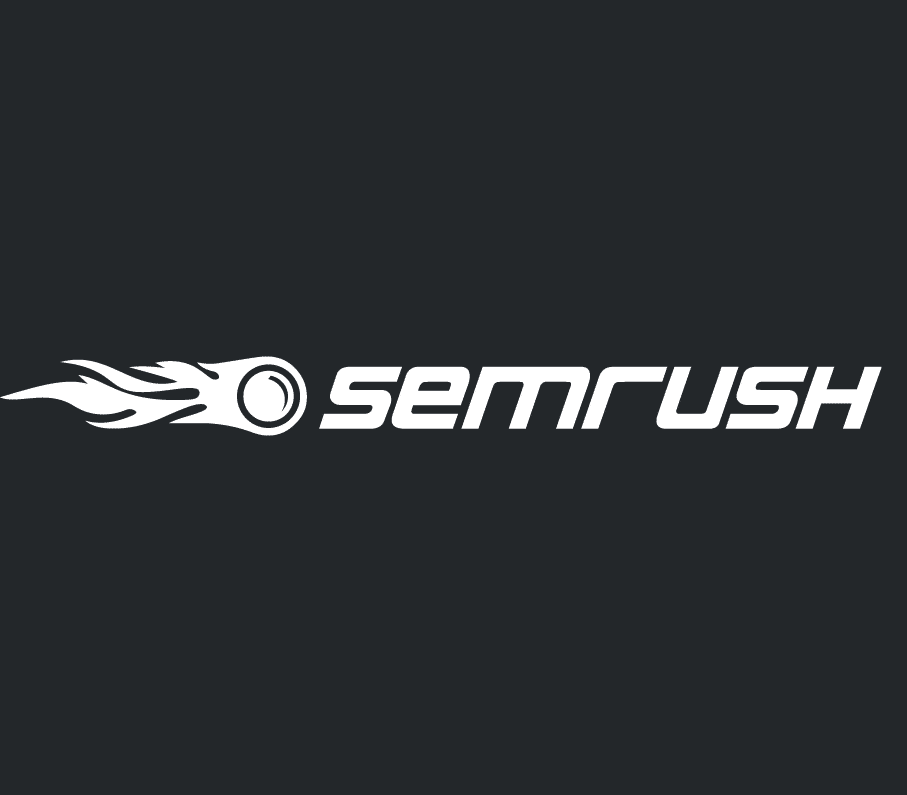
Semrush is a premium SEO program that allows you to find keywords, but it also has the option for you to optimize content within its tool as well.
It’s worth noting that while the first three options (along with RankIQ) serve the MAIN purpose of optimizing content, for Semrush it was a later add-on. By default, this is a keyword research and monitoring tool. And it’s really good at doing that. They have great data, a user-friendly setup, and an overall nice experience.
But as a Semrush user, you can also access their optimization tool. And, honestly, it’s pretty good. If you want to spend “it” all in one place, I recommend that place be Semrush.
You can bundle a bunch of tools right into this one, without sacrificing quality on any of them (in my opinion).
However, you do need to consider the ultimate cost of working with Semrush. Their smallest plan starts out at $119 per month. However, with that plan, you can eliminate smaller bills like RankIQ (or any alternative you might go with), Keysearch and TrueRanker.
Not to mention there is ALSO a social media tracking and scheduling system built right in.
This tool is most comparable to Ahrefs, and I’ve found in all my years as a blogger and freelance writer, you either love one or the other.
I happen to love Semrush, but one of my good blogging friends is a HUGE proponent of Ahrefs – and honestly, it’s just based on preference at that point.
5. SurferSEO

SurferSEO is pretty much the original version of these SEO/content optimization tools. It’s been out for a few years now, and is honestly the most well-developed one of all of them. Unfortunately, their pricing reflects that, and though I love their software, there are plenty of other options that are more affordable.
The Lite plan with surfer starts out at $29/monthly and gives you access to 3 reports, which is quite small compared to everyone else. Their largest plan is $299 and only lets you use 50 per month. Ultimately, it’s not the most affordable option.
However, I truly love SurferSEO’s UI. It’s sleek and engaging. SurferSEO’s features include:
- Keyword Research
- Content Editor
- AI Outline Generator
- Keyword Surfer Extension (free to use with Google Chrome for anyone, you can add it right now!)
- SEO Writer’s directory
Unlike WriterZen and RankIQ which include everything in even their base plan, SurferSEO has some paid add-ons that you can utilize, including:
- SurferAI (this is a brand new addition)
- GrowFlow (weekly bites of information and tasks to help you grow your domain)
- Audit (allows you to audit and optimize old posts)
I don’t personally love the ideas of add-ons. I get why they exist (especially the AI, which does cost money to produce). However, I really prefer everything to be included and your usage to be based on limits.
Are there any free alternatives to RankIQ?
Honestly, I WISH.
There are no solid free alternatives that I would recommend instead of RankIQ. You do have the option to independently pull the data (ish – you’re limited on what you can do manually) and do your own content optimizing in a plain word doc or right in WordPress.
However, that’s really not a great long-term option for content publishers.
The other big bummer is that most of these tools don’t have a free trial. While you can often get a discounted starting-out plan (like paying $1), you still have to pay to get access to even try it out.
Final Thoughts: RankIQ Review
RankIQ is a great tool for those looking to optimize the content on their blog.
Not only does it give you help with picking out the right keywords via their Keyword Library, but you can run reports, optimize your content and keep track of your progress.
It’s a great, simple-to-use tool set for bloggers and writers of all shapes and sizes.
My favorite function of RankIQ really is the Keyword Library. While I do recommend that you verify anything in there before you commit to it, it’s a great way to cut down on your brainstorming.
Why guess what you should be writing when you have a big database you can pick from?
Second-to-that is their Content Optmizer which helps you figure out what needs to go in your content for it to (possibly) rank on Google (preferably high). I find it easy to use and perfect for anyone just getting to know SEO and how to write for the web.
But it’s not all butterflies and roses with RankIQ, I do have a few complaints:
Chief among my complaints is the fact that I can’t properly organize my keywords. I also don’t love their UI. It feels a bit clunky and old school to me (and not in a fun nostalgic way).
Those two complaints aside, it is really a great AI SEO tool. If you’re on the fence of which tool you want to try out, I could easily recommend taking RankIQ for a spin for a month and seeing how you like it.
However, make sure that you use ALL your reports. Your report allowance DOES NOT roll over to the next month if you don’t use them all. But you CAN access reports that you’ve already run.
So even if you don’t manage to use your full allotment that month, run reports for keywords you want to write for and get to them when you can. Don’t waste them if you’ve already paid for them!
RankIQ FAQs
Is RankIQ good?
My experience with RankIQ has been good and while it’s not my favorite tool to use, I really think it can make for a great addition to your blogging strategy. Not only does it help with finding keywords, but you can pen a great article that might just be able to bring in some solid organic search traffic.
How much does RankIQ cost?
RankIQs plans range from $29 to $199, and the best plan for you depends on how much content you create. The plans are based on the amount of AI SEO reports you can pull, then subsequently use the content optimizer for.
How does RankIQ work?
RankIQ is built to be an all-in-one content planning and optimizing tool. You select a keyword from the keyword library, their internal system uses AI to pull an SEO report based on the content that’s currently ranking. It then guides how to structure and write your own post, and provides an internal word processor that helps you optimize your content.
How accurate is RankIQ?
RankIQ is only as accurate as the data it pulls, and while their SEO tools have a sweet AI set-up, it’s risky to put all your faith in their system without any input of your own. In particular, I find their “high traffic keywords with low competition” to be inaccurate when it comes to content for my fashion blog. Overall I think it’s a great tool, but it’s not 100% accurate (regardless of what they say).
Is RankIQ safe to use?
RankIQ is safe to use, you won’t be penalized by Google, or any other search engine, for using it properly. To clarify, while RankIQ does use AI to create content reports and run its content optimizer, it’s not an AI writer.
Who is the owner of RankIQ?
RankIQ was founded by Brandon Gaille, the host of the Blogging Millionaire podcast. Not only is he the founder of the tool, but he’s a content creator himself with experience trying to rank content on search engines.
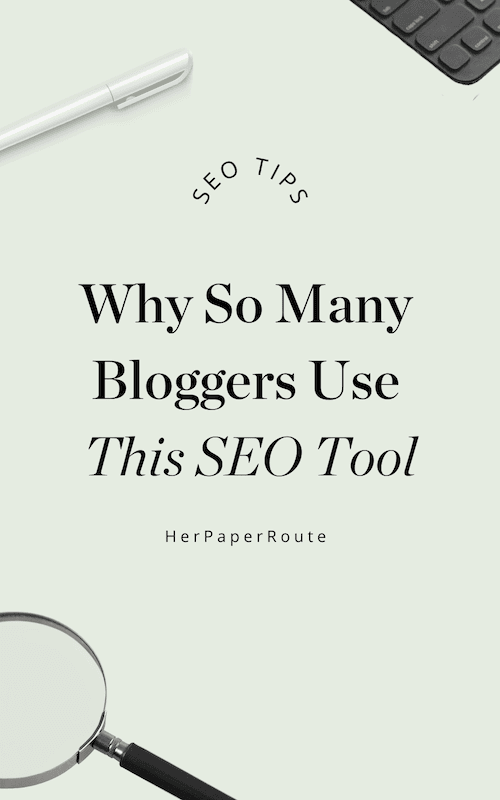
Follow along on Instagram!




